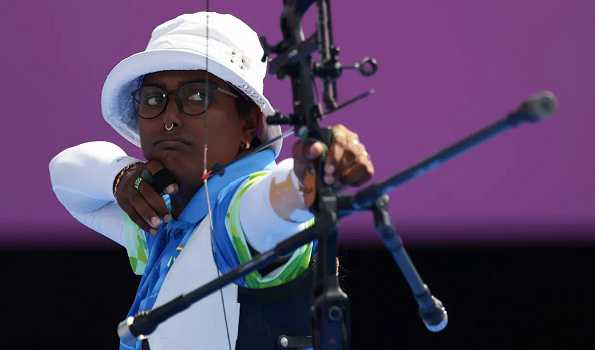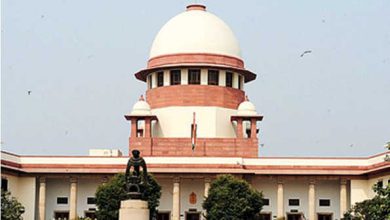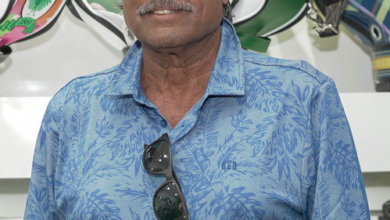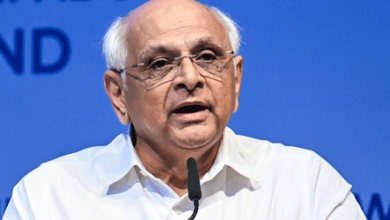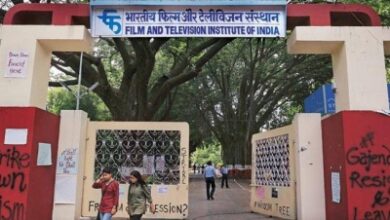Kashmiri Pandit organisations claim temple land in J&K’s Srinagar used for ‘illegal construction’
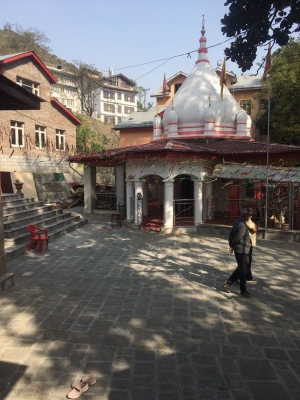
New Delhi, April 30: Despite building permission from the Srinagar municipal corporation (SMC) and a ‘No Objection Certificate’ from the revenue department, Kashmiri Pandit organisations allege that the piece of land over which a super specialty hospital is coming up in J&K’s Srinagar city is temple property.
In its letter sent to the Union Home Minister, Amit Shah on April 24, Kashmiri Pandit Sangarash Samiti (KPSS), an organisation of Kashmiri Pandits, has said, “The usurping of temple land owned by Durga Nag Trust and after that construction of building illegally against the directions of the Hon’ble High Court, passed in one of the petitions filed / represented by the members of the KPSS, and which will be run as Paras Hospital is one of the glaring examples that how a system is used in very dignified way in order to strip down the property belonging to the temple and make it a third party concern and subsequently earn revenue out of it and use it against the Kashmiri Pandit settlements.
“KPSS have submitted a number of complaints about this construction and implementation of Hon’ble High Court directions which were passed from time to time but the concerned officers, acted deaf and dumb.”
Another Kashmiri Pandit organisation called JK Peace Forum has also levelled allegations of illegal construction by vested interests on the Darga Nag temple property in Srinagar.
In a press statement, the forum said, “Since the last 33 years, no successive governments took any initiative to protect temple properties of minorities of Kashmir, despite repeated court orders, temple properties have been illegally given on lease.
“Jammu and Kashmir Administration/Revenue Department has failed to protect the temple properties and has been unable to vacate the temple properties /premises, which have been leased out by the respective managements illegally for personal favours.
“In Reference to order of High court of Jammu & Kashmir at Srinagar in case number OWP 785/2008 IA NO 1559/2008 DT 27/11/2010 & Subsequent order / decision of the High Court of Jammu and Kashmir at Srinagar LPA No 180/2010, IA 53/2011, IA 60/2011, IA313/210 & IA 89/2011 dated 13/05/2011, the court in its decision / orders said the property of the mandir is required to be protected.
“The property of the mandir is for the benefit of the temple and the temple is required to be preserved for the larger interest of the public.
“It also says that the property of mandir should be preserved and protected from encroachments and illegal transfers. The Honorable court also directed the J&K administration / revenue department not to issue any FARD regarding properties of the mandir.
“The Honorable High court in its orders /decision further directed that no transfers, in the shape of sale deed, Patta Nama, lease or any other mode of the transfer be effected in respect of the property belonging to the mandirs (temples). The Honourable court in its order also specified that no construction should be permitted on the temple properties, which have been transferred to the private parties through various deeds executed by the parties.
“Subsequently, the high court of Jammu & Kashmir and Ladakh in case OWP No.1597/2015 IA No.2/2015 IA No.1/2016 CM No.3731/2019 CM No.5586/2021 dated between Ghulam Rasool Bhat Vs. State of J&K, pronounced judgment on 04.12.2021 stating: ’16 Section 3 of the Act prohibits alienation of immovable property of a migrant not only by the act of the parties but also by a decree or order of the Court without the previous permission of the Revenue and Relief Minister’. It further provides that any alienation of immovable property in contravention to the provisions of the Act shall be null and void.
“On 6th Sept 2021 Hon’ble Supreme Court of India in the matter of the State of Madhya Pradesh vs. Pujari Utthan Avam Kalyan Samiti; CA 4850 OF 2021 LL 2021 SC 418 Coram: Justices Hemant Gupta and A.S. Bopanna ruled that all temple property is owned by the Deity as a legal person and the name of neither the District Collector nor the Pujari be put in the property ownership papers (Revenue records).
“The highlights of the Supreme Court judgement are that the land and other immovable property of a (public, not private) Temple belongs to the deity. Say we have a temple for Lord Krishna or Maa Lakshmi, the immovable property is owned by Lord Krishna or Maa Lakshmi, i.e., the deity (and no one else).
“The main deity will be accepted as a Juristic person.
“The government has no ownership on the immovable property of the Temple. The priests or servitors are not also the owners of the immovable property. They are mere managers and don’t have right to lease or sell temple’s immovable properties.
“The Hon’ble Supreme Court in the judgement ordered that all the temples’ land shall be entered in the name of the deity in the state revenue records. Section 27 of the judgement says ‘In the ownership column, the name of the deity alone is required to be mentioned, as the deity being a juristic person is the owner of the land’,” the statement said.


